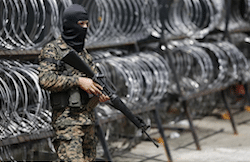El Salvador’s Congress unanimously approved a packet of “extraordinary” measures to be implemented in the country’s prison system as tensions in the government’s standoff with street gangs continue to deepen.
President Salvador Sanchez Ceren signed the bill into law almost immediately after the April 1 vote and the Prensa Grafica reported that it would go into effect within 24 hours. The measures (pdf) will tighten restrictions on prison inmates and halt them from ordering crimes from behind bars, reported El Diario de Hoy.
Minister of Justice Mauricio Ramírez Landaverde deemed the measures necessary because “the ordinary regulations are insufficient” to effectively control the prisons, creating conditions criminal groups take advantage of.
The measures will be in effect for one year and include provisions for:
- The isolation or transfer of dangerous inmates to special, more restrictive jail conditions (on March 28, 299 mid-level gang members were transferred to Quezaltepeque prison, recently modified to enhance security)
- The suspension of inmate transfers to judicial proceedings (a judge or court will conduct any necessary proceedings virtually or within prison walls)
- The restriction of visitation rights
- Mandatory inmate participation in reeducation and work skills programs
- The cutting of telecommunications traffic to prisons
The measures will first be implemented in seven prisons where a state of emergency was recently declared, with other prisons potentially included in the future.
Telecommunications companies that do not cut service in and around prisons by an established deadline could be fined $750,000 per day. New telecommunications infrastructure, such as cell towers, can not be placed within 500 meters of any prison.
Additionally, the law streamlines the process for making prison renovations or constructing temporary centers to house less dangerous inmates. According to La Prensa Grafica, El Salvador’s prisons have a designed capacity of about 10,100 inmates, but hold 33,000.
InSight Crime Analysis
The new measures are the latest in a string of recent government initiatives to control El Salvador’s extreme levels of violence. The first two months of 2016 averaged 23 murders per day, a 120 percent increase over the same period in 2015.
These initiatives have specifically targeted the country’s notorious street gangs, which are largely behind the violence, inflaming tensions between the government and powerful MS13 and Barrio 18 gangs. The new law, however, takes a direct shot at the heart of the gangs: their imprisoned leadership.
SEE ALSO: InDepth: Prisons
El Salvador’s prisons have long acted as vital centers of gang activity, providing an incubator for members to recruit, coordinate and consolidate themselves. They have continued to engage in criminal dealings — particularly extortion via cell phone and enforced by gang members on the outside.
If implemented effectively, isolating the gangs’ top leadership, nearly all of whom are behind bars, from the outside world could potentially throw the gangs into disarray.
In the short to medium term, however, the crackdown could provoke a backlash from gang members on the streets, increasing levels of violence. That is what happened early in 2015 after officials transferred gang leaders to maximum-security prisons following the collapse of a gang truce.

